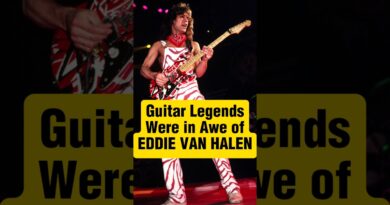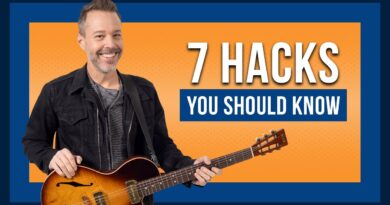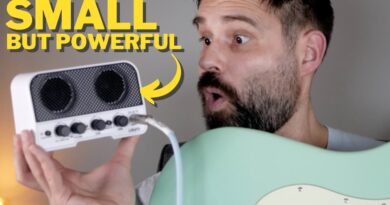Jazz Guitar Lesson – Phrases Not Scales – Henry Johnson
➤ Save 30% on Your First or Next Order with Code “YTFIRST30” and Download Henry’s TAB, notation, jam tracks, video jazz guitar lessons and much more: https://bit.ly/39cNebo
➤ SUBSCRIBE for more free lessons: https://www.youtube.com/c/TrueFireTV?sub_confirmation=1
Join Free: https://truefire.com/online-guitar-lessons
Download Free Apps: https://truefire.com/apps
Instagram: https://instagram.com/truefiretv
Facebook: https://facebook.com/TrueFire
Twitter: https://twitter.com/truefiretv
Courses: https://truefire.com/courses
Sales: https://truefire.com/sales-promos
Learning Paths: https://truefire.com/learning-paths
In The Jam: https://truefire.com/in-the-jam
Private Lessons: https://truefire.com/private-lessons
Jam Tracks: https://truefire.com/jam-packs
Guitar Chord Charts: https://truefire.com/guitar-chord-charts
Metronome: https://truefire.com/metronome
Guitar Tuner: https://truefire.com/guitar-tuner
#Jazz #Guitar #Lesson #Phrases #Scales #Henry #Johnson
Originally posted by UCiReSwhx7y_LpNFNg4GCuCQ at https://www.youtube.com/watch?v=UST4NsW9pKU




Excellent
Great stuff???? What strings d u play?
Is it lil wayne picking style?? Lol
I'm not a big scale person. I've learned how to improvise over all chords, through all positions of the neck, so I never even consider scales. The great Earl Klugh said when asked if he practiced scales…I don't use scales, why would I practice them? This says it all!
To prove your point, go to the famous song by the Spinners. I'll Be Around. Listen to the bass line at the break between the chorus. The notes are 1- [pause] 2-3-4, 5-6-7, 8-9-10. Timing is critical. How are practicing any group of scales help you do that? It would sound better if you hit the wrong note, rather than miss that timing and moves. How is any music theory going to help you with doing that part of the song? It won't. You either feel it and get, or you don't. It's quite that simple. Or that involved.
I don't know if this relates to what you're saying since I don't have the first clue. Anyways, there is a beautiful and famous, certainly to me, Miles Davis song called Tutu. In an attempt to make a fuller sound, which I obviously can't do like Miles Davis and David Sanborn together, I rip off Wes Montgomery's famous octave approach. So, I'm goin' though this and I pretty much got it. Even as slow as Tutu is, tempo wise, I have got to be smooth and to the point. It is going to take a great deal of practice for me to keep the sound even, not miss, and so forth. But at least I do have this memorized and I must keep at it. I already know the bass line. Now comes to the subject that you're talking about here. To do what I absolutely have to in order to play this song, how on Earth is practicing scales gonna help me succeed in playing Tutu? Like you, I've already heard these music theory geniuses run their collective mouths about it. There are absolutely no alternatives in playing that melody to Miles Davis' song on guitar, and if there were, they wouldn't amount to a hill of beans. And running up and down the neck with some kinda scales or whatever, isn't going to help me one iota to play this song. Maybe this isn't legitimately called phrasing, I wouldn't know. I'm not musically inclined. But I will call anybody's bluff on what I'm trying to do as opposed to this scale practice, or something. Does this relate to your phrase dissertation here?
Thank you Henry
????????????????????
This is an excellent lesson. Thanks.
I first heard the term "phrasing" over 40 years ago when I was teaching myself to play guitar. I had absolutely no idea what it meant. We didn't have YouTube back in the day. (I encountered the term in Guitar Player magazine.) I understood what a phrase was in a linguistic sense, and I knew that a musical phrase meant the same thing. But my sense of time wasn't fluid enough at that early stage of learning music to "float over the groove", or "lead into the one beat" with a series of notes, or hold a note over a chord change. It's a matter of loosening up and hearing what you are going to play before you play it.
Thai You ,Mr. Johnson , giving us a Part of your time .
The best part to learn it ,is here ????
I'd rather hear you play something than say something
Finally…..answers…..thankyou
Clip from "Henry Johnson – Jazz Expressions"
Все мелодии играет только большим пальцем. Верх профессиональной некомпетенции! Так играют только начинающие.
All melodies are played only with the thumb. The height of professional incompetence! This is how beginners play.
Ugh I want that tone.
I think he is the Best Teacher ever seen coz he can get there strategically; and through a very logical Method ????
this guys knows more about music than anyone else on the planet…
WHAT DO YOU THINK OF GEORGE BENSON AND PAT MARTINO? WHO IS YOUR ROLE MODEL OR MENTOR?
Phenomenal!!!! Such a clear concept, and this is now making me realise how players all the way from Stevie Ray Vaughan to Guthrie Govan get that open free sound that is constantly fresh and unique, I must practice this!
Love this lesson thank you I am a beginner. Subscribed
Simple yet profound.
Henry just opened up a world of possibilities for me! thank you!
He’s picking only with his thumb! ????
из всех видео наконец-то по существу.
If you see word "scales" or "modes" in title of video – it's useless trash. Ignore this. You need musical theory for playing music in the same amount as you need quantum optics theory in drawing/painting. You don't ! It's just creators need something to provide content on YouTube so they use endless landscape of theoretical classifications to fill the gap.
Where can I buy some of your lead guitar stuff? Thanks!!!
Seriously, "play phrases, not scales' is root.
Wisest words
Thumbs up
this is the best and easiest lesson i ever come across.
tanck you bro
4:07 im pretty sure there is hidden The Lick there
A brilliant lesson, it couldn't be clearer thanks for doing the video. ????????????????????????
play. stop talking. play. that's how you freaking play jazz.
Superb video…learned muchly!
I've been playing for 52 years… I didn't start learning scales until a few years ago and found out I was playing them all along… but as music. This video was a great help in explaining what I have been doing… and how I can play better.
@4:07 It's the lick!
I love Jazz but the problem is that I find Jazz musicians too snobby. Great teacher though.
I want him to play a bit of drowning pool on that guitar
Totally agree scales are just an alphabet, learners are often tricked into thinking that if they learn scales they are on their way to stardom. Great lead guitarists learnt to play learning licks and phrases not scales regardless whether you're a jazz, blues or a rock guitarist. You don't see them going up and down a scale repetitiously, they're always jamming out licks and phrases from all over the fretboard. Another fact about Great lead guitarists is that they are outstanding rhythm guitarists which learners don't often know about. You have to be a great rhythm guitarist who knows all their chords before you can be a great lead guitarist…